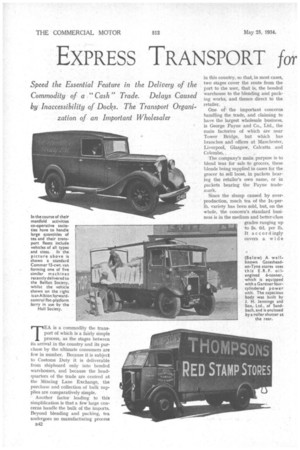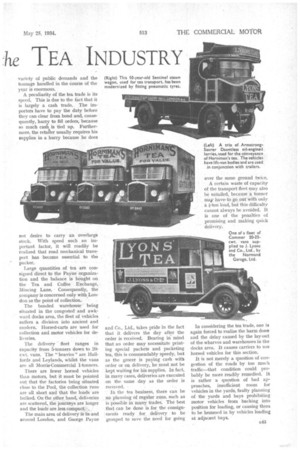EXPRESS TRANSPORT for he TEA INDUSTRY T EA is a commodity
Page 60

Page 61

If you've noticed an error in this article please click here to report it so we can fix it.
the transport of which is a fairly simple process, as the stages between its arrival in the country and its purchase by the ultimate consumers are few in number. Because it is subject to Customs Duty it is deliverable from shipboard only into bonded warehouses, and because the headquarters of the trade are centred at the Mincing Lane Exchange, the purchase and collection of bulk supplies are comparatively simple.
Another factor leading to this simplification is that a few large concerns handle the bulk of the imports. Beyond blending and packing, tea undergoes no manufacturing process B42
in this country, so that, in most cases, two stages cover the route from the port to the user, that is, the bonded warehouse to the blending and packing works, and thence direct to the retailer.
One of' the important concerns handling the trade, and claiming to have the largest wholesale business, is George Payne and Co., Ltd., the main factories of which are near Tower Bridge, but which has branches and offices at Manchester, Liverpool, Glasgow, Calcutta and Colombo.
The company's main purpose is to blend teas for sale to grocers, these 'blends being supplied in cases for the grocer to sell loose, in packets bearing the retailer's own name, or in packets bearing the Payne trademark.
Since the slump caused by overproduction, much tea of the Is.-perlb. variety has been sold, but, on the whole, the concern's standard business is in the medium and better-class grades ranging up to 3s. Od. per lb. It accordingly covers a wide variety of public demands and the tonnage handled in the course of the year is enormous.
A peculiarity of the tea trade is its speed. This is due to the fact that it is largely a cash trade. The importers have to pay the duty before they can clear from bond and, consequently, hurry to fill orders, because so much cash is tied up. Furthermore, the retailer usually requires his supplies in a hurry because he does not desire to carry an overlarge stock. With speed such an important factor, it will readily be realized that road mechanical transport has become essential to the packer.
Large quantities of tea are consigned direct to the Payne organization and the balance is bought on the Tea and Coffee Exchange, Mincing Lane. Consequently, the company is concerned only with.London as the point of collection.
The bonded warehouse being situated in the congested and awkward docks area, the fleet of vehicles suffers a division into ancient and modern. Horsed-carts are used for collection and motor vehicles for deliveries.
The delivery fleet ranges in capacity from 5-tonners down to 2(}cwt. vans. The " heavies " are Hallfords and Leylands, whilst the vans are all Morris-Commercial 1-tonners.
There are fewer horsed vehicles than motors, but it must be pointed out that the. factories being situated close to the Pool, the collection runs are all short and that the loads are bulked. On the other hand, deliveries are scattered, the journeys are longer and the loads are less. compact.
The main area of delivery is in and around London, and George Payne
and Co., Ltd., takes pride in the fact that it delivers the day after the order is received. Bearing in mind that an order may necessitate printing special packets and racketing tea, this is commendably speedy, but as the grocer is paying cash with order or on delivery, he must not be kept waiting for his supplies. In fact, in many cases, deliveries are executed on the same day as the order is received.
In the tea business, there can be no planning of regular runs, such as is Possible in many trades. The best that can be done is for the consign-ments ready for_ _delivery to be grouped to save the need for going In considering the tea trade, one again forced to realize the harm done and the delay caused by the lay-out of the wharves and warehouses in the docks area. It causes carriers to use horsed vehicles for this section.
It is not merely a question of congestion of the roads by too much traffic—that condition could probably be more readily remedied. It is rather a question of bad approaches, insufficient room for vehicles in the yards, faulty planning of the yards and bays prohibiting motor vehicles from backing into position for loading, or causing them to be hemmed in by vehicles loading at adjacent bays.




































































































